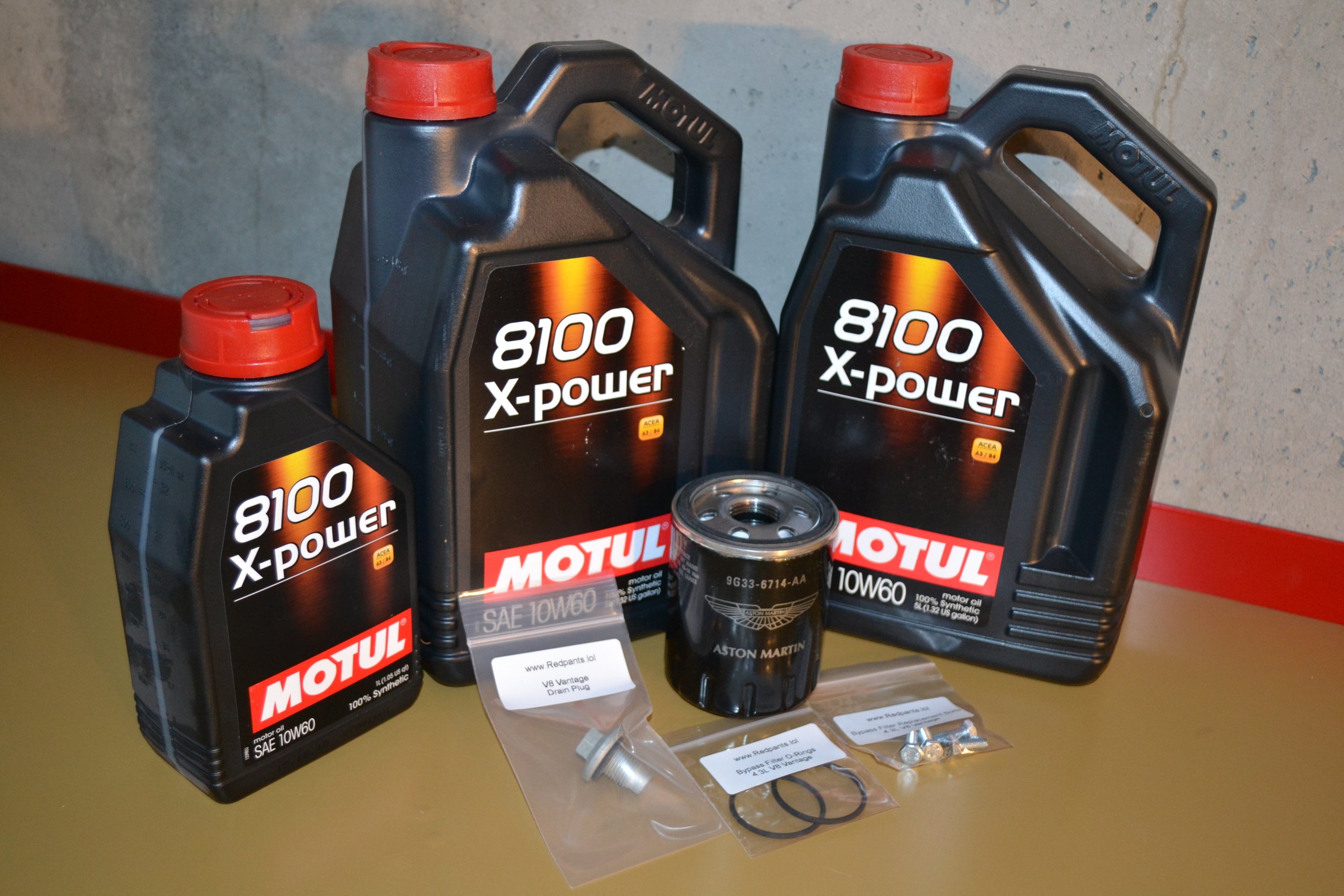
Liquid [Fool’s] Gold
This Article is based on a blog post from the original Redpants website. It was first posted on December 31, 2015. It has been updated since.
The information provided here is for general guidance purposes only. It is a combination of manufacturer guidance, first- and second-hand experience, and personal opinion. It may me inaccurate, incomplete, or outdated.
The mission statement for Redpants is a deceptively simple one:
The goal of Redpants is to make Aston Martin ownership reasonable.
One of the very earliest areas I was able to do this was supplying oil change kits when I first started my company and eventually adding engine oil. I was, um, urged to start doing my own oil changes after being charged $650 for one by my then-local dealership. My 2007 V8 Vantage is the first exotic I ever owned and I was expecting to pay a premium compared to the other cars I’ve had, but the bill for just an oil change was shocking. The next year’s service bill was for over $1400, with the higher price caused by the addition of intake filters, cabin filters, and a navigation screen repair (ironically, I expected the nav screen repair to be the costliest thing and it was the least expensive of them all).
Anyway, shelling out so much money for what I [rightly and correctly] thought would be simple service prompted me to start doing things myself. Since oil changes are the most common maintenance, I figured that’d be a good place to start and that led me to digging into the topic of engine oil.
Engine oil is a topic of discussion for any car with an internal combustion engine (so, anything that isn’t a fully-electric vehicle) but the conversation was rather different when it came to Aston Martins. When I first got into these cars, the vast majority of owners were adamantly against going against factory recommendations, and that included which type of oil to use.
The Original Factory Recommendation
If you pop the hood of your early V8 Vantage, you’ll see a label on top of the oil reservoir stating that Aston Martin recommends Castrol.
Look inside the car’s owners manual and you’ll see it specifies Castrol Edge Sport 10W60.
The next thing to note: That product no longer exists. It hasn’t in a very long time.
The “Edge” product line has been changed, reformulated, and rebranded numerous times over the years. At one point there were simultaneously Edge, Edge Sport, and Edge Professional variations of the same Edge product line. Even the Castrol TWS oil that some people swore by for so long is nothing more than a marketing spin on a reformulation that has come and gone. (TWS literally just stands for 10W60, by the way).
But none of that really matters because at one point, Aston Martin switched away from recommending Castrol engine oil for the V8 Vantage. The “Aston Martin Recommends Castrol” stickers on the oil reservoirs were quietly replaced with generic ones.
So, what happened?
The marketing deal between Aston Martin and Castrol expired. That’s it. When Aston Martin was no longer getting a financial incentive from Castrol to recommend that company’s products, they stopped doing so. It had nothing to do with engineering, science, mechanics, or anything else. It was marketing. Period.
Other Oil Options
Eventually, dealerships (at least in the US) were able to source engine oil for a lower price and that’s exactly what they did - I know of at least a few dealerships that started using Shell TwinPower engine oil at some point because it’s what was being used by BMW at the time in the naturally aspirated V8 and V10 engines of the then-current M3, M5, and M6.
Meanwhile, I was told during a conversation with one of the guys that lead engine development at Aston Martin that the best off-the-shelf engine oil they tested while he was there was from Mobil1, which is what became the factory fill for the V12 engines. He also said that they hadn’t tested any oils from companies that weren’t from the big names (so, they didn’t test Motul, LiquiMoly, etc) so he didn’t know how those would compare. Take that as you will, it’s more food for thought.
All this taken together leaves the DIY owner trying to figure out with they should use Castrol Edge, Castrol Edge Sport, Castrol Edge Professional, Castrol TWS, or Shell TwinPower. What about oils that Aston Martin hadn’t tested but are known to be exceptional, like Motul or LiquiMoly? Here’s the easy answer:
Use whatever engine oil you like that meets or exceeds the required specifications.
The immediate recoil some people may experience when hearing this is, “But what about Aston Martin’s recommendation?” Congrats, you’re a marketing department’s wet dream. I’m not saying that to upset anyone, I’m just being honest with you. What a manufacturer recommends can be distilled down to three questions:
1) Does it meet engineering requirements for its use?
2) Is it readily available in the quantities needed in markets where the car is sold?
3) Is it cost effective?
The Castrol engine oil first used by Aston Martin satisfied all three of these questions with the required “yes” answer, but Castrol sweetened the deal by (I assume) giving Aston Martin a financial incentive to add the recommendation labeling which acted as marketing for Castrol. An educated guess would be that Castrol discounted their oil supply to Aston Martin, which lowered production costs for the company - something they always need and that any company can appreciate.
As consumers looking at non-OEM options for engine oil (or anything), we need to ask ourselves those same three questions. There’s nothing wrong with sticking to Castrol Edge products - whatever happens to be current - but if you’re looking at other oils, you’ll need to know how to select the right one.
Picking an Oil
If you’re open to trying other types of oil, whether its for the benefits of better performance or cost savings, then you need to make sure the oil meets the minimum requirements and has the correct viscosity:
API: SL/CF
ACEA: A3/B3/B4
V8 Vantage: 10w60 (or 5w50 in cold climates)
V12 cars: 0w40
Many of you are probably wondering what those API and ACEA letters and numbers mean. Basically, they’re quality standards for oils. The newer the standards, the higher the quality and/or performance required to meet those standards. Rather than re-hash the explanations, here are the specs for API and the specs for ACEA if you want to read about them.
The one that is slightly more confusing is the SL requirement. All you really need to know is that the second letter is replaced alphabetically as the oil standards change. SL was the top standard when the V8 Vantage was first made. Then SL was superseded by SM, then SN, and so on. So if you’re looking for oil, just make sure it’s got an SL rating or higher (SM, SN, etc) and you’re good – it’s better than the original requirement. In some cases, the oil itself may be identical to what it used to be when it was SL-rated and the rating has now been increased to SN. Don’t get hung up on that. It just means the oil is still meeting rating requirements even as those requirements have gotten more stringent.
You can ignore the API CF requirement – the C-ratings are for diesel engines. If you’re curious, the rating schema is the same for those as the S-ratings. CF was superseded as well.
When people ask “What oil should I use in my Aston Martin?” my response is always the same:
“Any high-quality fully-synthetic engine oil of the correct viscosity will be fine.”
If you have a Gaydon-era V8 Vantage, that’s 10w60 (or 5w50 if you’re in a colder climate). If you have a V12, that’s 0w40.
The reason for the somewhat open-ended answer is because any high-quality fully-synthetic engine oil will surpass the original oil’s requirements (probably surpass the original oil’s performance as well), so any of them will be fine. Pick whichever one you prefer, just make sure it’s the right viscosity.
That’s really all there is to it. There’s no reason to overpay for a specific product or brand - oil may be called liquid gold, but don’t feel like you need to overpay for fool’s gold.
Doing your own oil change and want to support Redpants? Please consider buying an Oil Change Kit from my Online Store, and check out the selection of Motul oils I offer!




